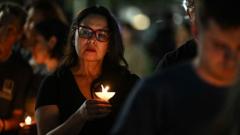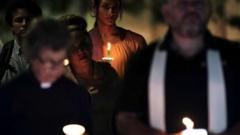As survivors and families gather to honor the legacy of those lost, the indelible marks of Bergen-Belsen remind us of humanity's darkest chapters.**
Remembering Bergen-Belsen: Eight Decades Since Liberation and the Echoes of Atrocities**

Remembering Bergen-Belsen: Eight Decades Since Liberation and the Echoes of Atrocities**
Commemorations mark 80 years since the liberation of Bergen-Belsen, shedding light on the horror endured by survivors of the Nazi concentration camp.**
Eighty years have passed since the liberation of the Bergen-Belsen concentration camp, yet the haunting memories of its horrors persist. On April 15, 1945, British and Canadian forces liberated the camp located in northern Germany, confronting the grim reality of Nazi atrocities that words alone had struggled to convey. The soldiers were greeted with a scene of unimaginable suffering, finding an estimated 13,000 unburied corpses amid 60,000 severely malnourished survivors.
To commemorate this 80th anniversary, over a thousand survivors and descendants came together to honor the past and remember the lives lost at a somber event held at the former camp site. Among them is the poignant perspective of British soldier Michael Bentine, who referred to Belsen as "the ultimate blasphemy."
The notorious reputation of Belsen emerged partly because of its complete preservation during the war. Unlike death camps like Treblinka and Auschwitz, which were either obliterated by the Nazis or evacuated, Bergen-Belsen retained its harrowing evidence even as the conflict came to an end. It became a final stop for many prisoners from the eastern camps, leading to outbreaks of disease, malnutrition, and rampant death — with 500 people perishing daily as the Reich collapsed.
Tragically, the day after liberation, many prisoners continued to die due to the sudden influx of nourishment that their bodies could not handle. The camp, once a place of death, is now a site of remembrance, though its physical specters have been eradicated; British soldiers burned the huts to halt the spread of disease.
On this momentous day of memory, dignitaries, including UK Deputy Prime Minister Angela Rayner, gathered to lay wreaths in honor of the victims. A psalm was recited by UK Chief Rabbi Sir Ephraim Mirvis amidst a backdrop where the harsh remnants of watchtowers and barbed wires have faded into the grasslands of Lower Saxony.
Today, only a visitor center and memorial stones remain, marking the unmarked graves and lost lives — a stark reminder that Bergen-Belsen still echoes with the traumas of its past, urging humanity to remember and reflect.




















